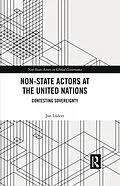This book explores the role and relevance of non-state actors (NSAs) in the international system by analyzing the ways these actors gain influence in the United Nations (UN). Offering a systematic, theoretical, and empirical account of how NSAs contest and potentially change state sovereignty through the UN the author considers the successes and failures of national liberation movements and indigenous peoples and examines how and under what conditions such a challenge is possible. This book will be of great interest to scholars and graduate students in the fields of international law, politics, history, human rights, and governance. It will be especially useful to those with an interest in the proliferation of non-state actors in the international system and the role and relevance of Intergovernmental Organizations.
Autorentext
Jan Lüdert is an Associate Professor at City University of Seattle where he serves as Director for Curriculum & Instruction. He is a current Visiting Research Scholar at the Ralph Bunche Institute for International Studies at City University of New York's Graduate Center as well as a Research Associate with the German Research Fund 'Dynamics of Security' project at Philipps Marburg University. His research focuses on the role and relevance of multiple actors in global governance and the contestations of global norms.
Inhalt
1. Introduction 2. Contesting Sovereignty: Conceptualizations and Theories 3.National Liberation Movements at the UN 4. Indigenous Peoples at the United Nations 5. Conclusions
